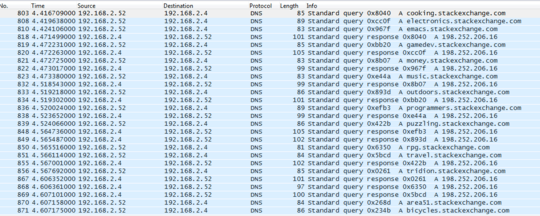3
I want to log all DNS lookups from computers on my home wireless network. What's the best way to do this?
Options I know of:
Using OpenDNS and let it log queries for me. However, in order to then generate reports from their logs, I have to use a javascript-enabled headless browser to log into their
statsweb page and download stats to a script. This is painful.Run my own DNS server using djbdns or dnsmasq or some caching resolver (that isn't
bindbecause that scares me), and have it generate log files. The problem here is making sure that nameserver stays up and the logs are rolled, etc.Use port-forwarding with logging and run
iptableson a machine to forward to 8.8.8.8:53 (or whatever) after logging each query. This has the advantage that I'm forwarding to a robust DNS server rather than running my own, but I don't think what's logged will contain the full DNS query (there appears to be a netfilter hack that does what I want, but I'm reluctant to modify my kernel for this simple project).
Are there other options that I'm overlooking here?
